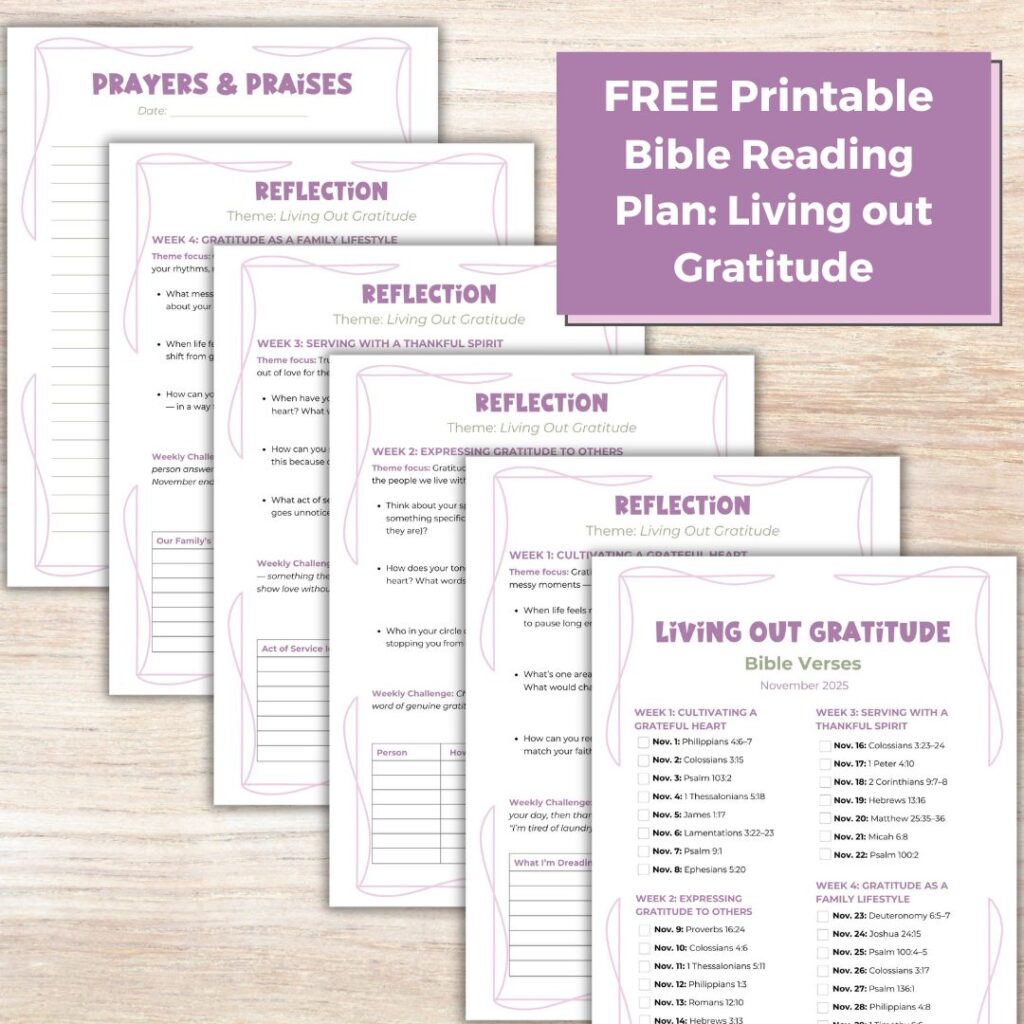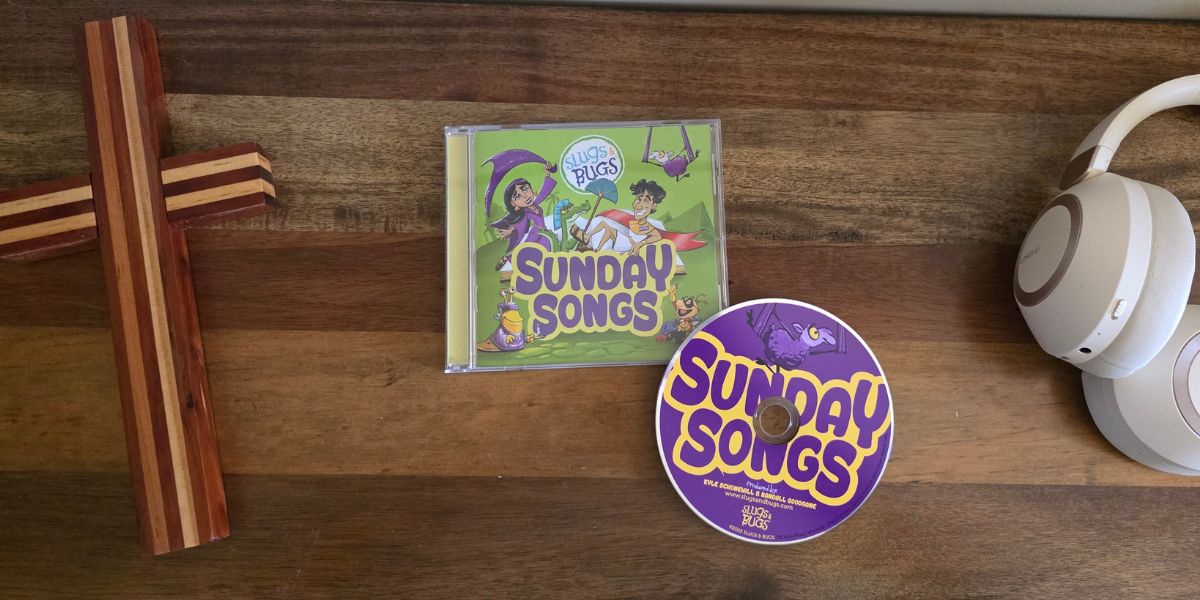Scriptures to uplift the overwhelmed mom
Some days, motherhood just feels like a lot. Too many needs, too many thoughts running through our heads and not enough quiet to catch our breath.
Even Christian moms can be struggling moms. We love our kids deeply, yet still feel overwhelmed.
The good news is that God’s Word can uplift us when our own strength is running low. Take a deep breath and slow down as you reflect on these Bible verses for overwhelmed moms.
The truth is, feeling overwhelmed doesn’t mean you’re a bad mom or that your faith isn’t strong enough. It usually means you’re doing your best in a season that feels heavy.
Motherhood has a way of piling things on all at once — the mental load, the worry, the pressure to do it all well — and sometimes it just catches up with us.

These Bible verses are for overwhelmed moms who are tired, stretched thin and wondering how to keep going on hard days. They aren’t meant to add one more thing to your to-do list or make you feel like you need to fix yourself.
Instead, let these verses bring you the peace of God as you connect with your Heavenly Father, who sees all the hard work you do each day. God is right here with you, even in the middle of the chaos.
Bible verses for overwhelmed moms who feel exhausted and worn down
If you’re an overwhelmed mom, chances are you’re also an exhausted mom. You’re the kind of tired that sleep doesn’t fix.
The kind of tired that settles into your bones after too many long days, too many challenging moments and too much responsibility resting on your shoulders. These are the days when motherhood feels especially heavy and you wonder how much longer you can keep going.
The Word of God doesn’t overlook those weary seasons. In fact, Scripture speaks directly to struggling moms, reminding us that God sees our hard work and meets us in hard times.
“Come to me, all you who are weary and burdened, and I will give you rest. Take my yoke upon you and learn from me, for I am gentle and humble in heart, and you will find rest for your souls. For my yoke is easy and my burden is light.”
Matthew 11:28–30 (NIV)
When motherhood feels overwhelming, Jesus doesn’t tell us to push harder or try to do more. He invites us to come to Him just as we are — weary, worn down and in need of rest.
No matter where you are in your motherhood journey, you need the rest that comes only from leaning into Christ Jesus. Whether you’re navigating sleepless nights with a newborn, a quiet house after your child moves out or somewhere in between, Jesus understands the weary mom and is right there to give us His perfect peace.
“He gives strength to the weary and increases the power of the weak. Even youths grow tired and weary, and young men stumble and fall; but those who hope in the Lord will renew their strength. They will soar on wings like eagles; they will run and not grow weary, they will walk and not be faint.”
Isaiah 40:29–31 (NIV)
Some seasons of motherhood leave us running on empty. This verse is a reminder that when our own strength is gone, God supplies what we lack, every step of the way.
This is one of my favorite Bible verses because it reminds me that we all struggle no matter our ages or stages of life. And God sees that struggle and gives us strength for each season of life.
“Let us not become weary in doing good, for at the proper time we will reap a harvest if we do not give up.”
Galatians 6:9 (NIV)
On hard days, it can feel like all your effort goes unnoticed. God’s Word reminds us that the daily work of motherhood matters, even when it feels unseen or unappreciated.
Because, let’s face it, on tough days, we can feel like we are working hard for little to no reward. But this verse encourages us that our good work truly does matter and make a difference.
“Therefore we do not lose heart. Though outwardly we are wasting away, yet inwardly we are being renewed day by day. For our light and momentary troubles are achieving for us an eternal glory that far outweighs them all. So we fix our eyes not on what is seen, but on what is unseen, since what is seen is temporary, but what is unseen is eternal.”
2 Corinthians 4:16–18 (NIV)
Even in the trenches of motherhood, God is still at work. Exhaustion doesn’t mean nothing is happening. It means God is renewing us in ways we may not see yet.
We may be up to our elbows in dirty diapers and wondering when God’s renewal is coming. Or we may be practically living in our cars as we chauffeur children from one activity to the next and struggle to see the power of Christ at work.
Yet, these verses assure us that God is always working, renewing and strengthening in ways we can’t see. We can trust that God is with us even in difficult times.
Bible verses for overwhelmed moms who feel anxious and worried
When you’re overwhelmed, anxiety often isn’t far behind. Your mind won’t slow down, worries stack up and fear can sneak in when you least expect it.
Motherhood has a way of amplifying anxious thoughts, especially when you care so deeply and feel responsible for so much.
God’s Word speaks directly to anxious hearts. The following Bible verses remind overwhelmed moms that God offers real peace — not a shallow calm, but the kind of peace that steadies us even when our thoughts feel loud and out of control.
“Do not be anxious about anything, but in every situation, by prayer and petition, with thanksgiving, present your requests to God. And the peace of God, which transcends all understanding, will guard your hearts and your minds in Christ Jesus.”
Philippians 4:6–7 (NIV)
As an anxious mom myself, I’ve always been a bit challenged by this verse. When I think of it on my own, then I’m overwhelmed by the command to not be anxious about anything.
On my own that is pretty impossible. My own understanding of life and anxiety tell me I can’t live this way.
But the God of hope tells me differently. When I focus on who God is and His peace, then my anxiety does fall away. It’s less about trying on our own to not be anxious and much more about leaning on our everlasting God who holds everything in His hand.
“You will keep in perfect peace those whose minds are steadfast, because they trust in you.”
Isaiah 26:3 (NIV)
Having a steadfast mind is the best way to have God’s peace. In real, busy mom life that looks like finding little ways throughout the day to pause and remember God is with you every step of the way.
This might look like taking a moment to pray while you’re driving to school pick-up. Or it might look like taking time to sing along with worship music as you make snacks.
Finding practical ways to connect with God and embrace Him throughout the day can help you find God’s peace in the chaos.
“For God gave us a spirit not of fear but of power and love and self-control.”
2 Timothy 1:7 (ESV)
The NIV translation says the Spirit of God doesn’t make us timid. But, I relate a bit more to the ESV translation here.
I struggle with fear. Since becoming a mom, I’ve learned about a new spirit of fear that can nearly paralyze me.
But I’ve also learned about the power of the Holy Spirit to calm my fears. Sometimes taking time to really think about the unconditional love of God can help allay my fears.
After all, fear doesn’t get the last word — God does.
“Peace I leave with you; my peace I give you. I do not give to you as the world gives. Do not let your hearts be troubled and do not be afraid.”
John 14:27 (NIV)
When we trust God, we are able to be filled with His peace. And His peace isn’t impacted by circumstances. Even in the hard and overwhelming seasons of motherhood, we can have peace in God.
This verse can become a great prayer: “Dear God, give me your peace that is not like what the world gives. Help me to release my worries to you so that my heart isn’t troubled and I’m not afraid. Amen.”
Bible verses for overwhelmed moms who need comfort and reassurance
There are moments in motherhood when what we need most isn’t advice or answers, but comfort. When emotions feel heavy and tears come easily, it helps to be reminded that God sees us, knows our hearts and draws near in our pain.
These Bible verses are for overwhelmed moms who need reassurance that they are deeply loved and not alone. God’s comfort meets us in our weakest moments and gently reminds us that His compassion never runs out.
“Praise be to the God and Father of our Lord Jesus Christ, the Father of compassion and the God of all comfort, who comforts us in all our troubles, so that we can comfort those in any trouble with the comfort we ourselves receive from God.”
2 Corinthians 1:3–4 (NIV)
I do my best to be a good mom to my children. Yet, God is the best Father to us. He sees our fears and stresses. His heart aches with ours, even when He sees the big picture of how everything is going to work out and how we are growing in our faith along the journey.
And just like we mamas do for our children, so God also shows us compassion and comfort. He comforts us in our temper tantrums and on our hardest days.
“As a mother comforts her child, so will I comfort you; and you will be comforted over Jerusalem.”
Isaiah 66:13 (NIV)
Not much in human experience compares to a mother’s love. It can be a force of nature to be reckoned with, in fact.
So it’s not all that surprising that God promises to comfort us as a mother comforts her child. When our children are upset, we want to do whatever we can to comfort and help them.
Somehow God’s love for us is even greater than that!
“The Lord is close to the brokenhearted and saves those who are crushed in spirit.”
Psalm 34:18 (NIV)
When we are going through some of the darkest moments of life what we need most is someone to just sit with us in our heartache. God does just that.
During the times we are broken and downtrodden, He draws closer to us and brings His peace and comfort in ways we may not even see until looking back later.
Hard feelings and broken hearts don’t scare God away. In fact, they make Him draw closer.
“The Lord your God is with you, the Mighty Warrior who saves. He will take great delight in you; in his love he will no longer rebuke you, but will rejoice over you with singing.”
Zephaniah 3:17 (NIV)
I think this is one of the best Bible verses for overwhelmed moms. It isn’t one we come across a lot.
But the imagery of God as a strong and mighty warrior who is fierce and also full of love is powerful. Many times we can fall into a pattern of thinking of God as a harsh and authoritative father.
Yet He is a loving, good Father who rejoices over us any time we seek Him. He is waiting to love and comfort us, not simply rebuke us.
Bible verses for overwhelmed moms who need to remember God is with them
Overwhelm can make motherhood feel isolating, as if you’re carrying everything on your own. In long or difficult seasons, it’s easy to forget that God is present in the everyday moments, even when life feels chaotic or uncertain.
These Bible verses remind overwhelmed moms that God is always with them — strengthening, guiding and walking beside them through every season of motherhood. No matter where you are right now, you are never alone.
“So do not fear, for I am with you; do not be dismayed, for I am your God. I will strengthen you and help you; I will uphold you with my righteous right hand.”
Isaiah 41:10 (NIV)
This verse has gotten me through so many tough times during my life. Parts of the verse have struck me differently throughout seasons of overwhelm and struggle.
Sometimes I’m most comforted by the reminder that God is with me in my fear. Other times, I’m comforted in knowing that God is with me.
Still other times, I cling to the promise of His strength and help. And on the darkest days, I use the final part of the verse as a breath prayer: “God, uphold me with your righteous right hand.”
Whether you need comfort for fear, reassurance of His strength and help or the reminder that He holds you in His hand, these words from Isaiah can bring you God’s encouragement right where you are.
“Be strong and courageous. Do not be afraid or terrified because of them, for the Lord your God goes with you; he will never leave you nor forsake you.”
Deuteronomy 31:6 (NIV)
There isn’t much greater comfort than knowing that whatever we face, wherever we are headed, God is going with us. He won’t leave us hanging.
Remember the way He took care of you in the past? He’ll do it again. Our Heavenly Father isn’t one to leave us high and dry.
He goes with us through every moment and every situation.
“God is our refuge and strength, an ever-present help in trouble.”
Psalm 46:1 (NIV)
Not only is God always with us and helping us, He is our safe place to land. When life gets overwhelming, we can take a few moments and just rest in Him.
God is as close as a whispered prayer. Even a prayer as simple as “God, wrap your arms around me,” can bring peace to your heart in the midst of the hurt.
God is available right now, not just when life calms down.
“And surely I am with you always, to the very end of the age.”
Matthew 28:20b (NIV)
Never for a single moment of your life has God forgotten you. Never has He left your side.
He is with us in every moment and every season of life — and motherhood — even when we wander away. We can trust that God is with us through it all and will continue to be.
You don’t have to walk through overwhelm alone
Feeling overwhelmed doesn’t mean you need more to-do lists. It often means you need more support and connection.
If you’re looking for encouragement from other Christian moms who understand these seasons, you’re always welcome in the free Christian Moms with Grace Facebook community. It’s a place to connect, be encouraged and remember you’re not alone.
And if you’re craving deeper, ongoing support through Bible studies, gentle rhythms and faith-filled conversation, The Grace Circle for Christian Moms membership was created for seasons like this — a quiet, grace-filled space to grow without pressure or perfection.
Wherever you start, you don’t have to do motherhood alone.
Find more free resources of encouragement for overwhelmed moms:
7 Prayers for overwhelmed moms needing peace and strength



























